These cases seem like they’ve been going on forever and there may be one more round to go. But the oath-taking saga is nearing its end with the appeal court ruling on February 15, against Leung Kwok-hung, otherwise known simply as “Long Hair.”
This is in recognition of his trademark long flowing tresses, which he maintains as a gesture of protest against Chinese dictatorship. He has said he will not willingly cut his hair until Beijing leaders acknowledge their mistake in using armed force to clear Tiananmen Square of protesters in 1989.

Leung was among the six newly-elected Legislative Councillors who were expelled from the legislature for embellishing their oaths of office during the October 2016 swearing-in ceremony. The others have either appealed unsuccessfully or abandoned the attempt as a lost cause.
Leung is the last hold-out. Still unwilling to accept the disqualification verdict, he says he will seek legal aid and permission to make his case one last time, before Hong Kong’s Court of Final Appeal.
The judiciary’s lament
Probably aggrieved Hong Kong democrats should rethink their practice of seeking relief in appeals and judicial reviews. These have been seen as a safeguard against perceived official injustice in the years since Hong Kong’s 1997 return to Chinese rule and no one has been more assiduous in the pursuit of justice via this means than Leung.
An independent judiciary is probably the most prized of the “privileges” Hong Kong was allowed by Beijing under its post-1997 One Country, Two Systems governing formula; privileges is a new term being used by some, in deference to Beijing’s magnanimity, instead of the more common reference to rights and freedoms duly agreed upon before 1997.
But mediating between the two different legal systems, as they must, Hong Kong’s courts are gaining a reputation they don’t like – as the willing accomplices and enforcers of Beijing’s mandates.
The courts have also become part of the Hong Kong government’s strategy for “keeping up appearances,” that is, maintaining the appearance of judicial autonomy and independence via the liberal practice of allowing judicial reviews.
These would help more in terms of public relations, if it were not for the substance of the rulings handed down. As it is, the judiciary has taken to protesting its innocence at every opportunity.

During the ceremonies marking the start of the 2019 legal year in January, both the Chief Justice and the Secretary for Justice went out of their way to take note of their critics, plead for the confidence of the community, and reaffirm the judiciary’s commitment to its core principles of independence, equality before the law, adherence thereto, and transparency.
A few days later, as if in rebuttal, the pro-Beijing Bauhinia Foundation announced the results of a two-year, 2017-18, survey with some relevant findings on public perceptions.
Conducted by the Chinese University, with 2,000 respondents, the survey found that the maintenance of law and order ranked highest in terms of public perceptions about actual performance. But abuse of government power, government transparency, and judicial autonomy were among the lowest rankings.
Re-cap: on oath-taking
The judiciary’s protestations of innocence might have resonated more effectively were it not for the experience of Leung Kwok-hung and the five other newly-elected legislators who were expelled from the Legislative Council (LegCo), after due process, over their oath-taking protest on October 12, 2016.
In fact, it has been the “due process” aspect itself that has probably done more than anything else to undermine public trust in the judiciary’s independence.
The story is by now well known. The September 2016 LegCo election played itself out as a kind of referendum on the pro-democracy Umbrella Movement two years before. The spirit of that protest, and anger at Beijing’s backtracking on its promise to allow universal suffrage elections, lived on in the election campaigns of pro-democracy and pro-Beijing candidates alike.
Pro-Beijing candidates called on voters to reject those who had championed the disruptive 79-day street blockades two years before. But the voters chose otherwise. Democrats did better than expected. And those from the new post-Occupy generation vowed to carry the spirit of 2014 directly into the LegCo chamber itself.
They began on October 12, with an oath-taking protest, and got no further. Just as they initially did not appreciate that Beijing probably never had any intention of allowing genuinely free western-style universal suffrage elections here, so the newly-elected post-Occupy democrats did not at first calculate on the extent of Beijing’s determination to eradicate their political influence. Now they do, by reason of a few simple phrases written into a new document on oath-taking.

According to one official estimate, altogether 15 legislators-elect violated the terms of proper oath-taking at the October 12 swearing-in ceremony.
The most aggressive were two members of the new post-Occupy group Youngspiration. Baggio Leung Chung-hang (New Territories East) and Yau Wai-ching (Kowloon West) used derisive language during the ceremony and displayed banners proclaiming, in English, “Hong Kong is not China.”
Others interjected into their oaths demands for genuine universal suffrage, democratic self-determination, procedural justice, an end to tyranny, and so on, all in the spirit of 2014.
It took officials in Beijing less than a month to issue a formal Interpretation of Hong Kong’s post-colonial Basic Law constitution, Article 104, on oath-taking. The Interpretation was issued by the Standing Committee of the National People’s Congress (NPCSC) on November 7.
The interpretation seemed harmless enough, something like a back-to-basics reminder about proper parliamentary decorum. But in the hands of Beijing and Hong Kong officials, the November 7 interpretation of Hong Kong Basic Law Article 104 has established the rationale for purging the entire generation of leading political talent that emerged from the 2014 protest movement.
The interpretation said the obvious, namely, that all Hong Kong officials must pledge allegiance to the Hong Kong Special Administrative Region of the People’s Republic of China (PRC). But there was more: the content of the oath must also become the legal requirement and precondition for contesting elections and taking up public offices, a precondition that Hong Kong election officials have since taken to enforcing.
Additionally, according to the interpretation, the oath must be taken, sincerely, solemnly, accurately, and completely. If there is some intentional lapse, the oath cannot be retaken.
Yau and Leung were immediately disqualified by court order, with the first judge adding a caveat that he would have ruled the same even without Beijing’s November 7 interpretation. His verdict was then upheld through several rounds of appeal court rulings.
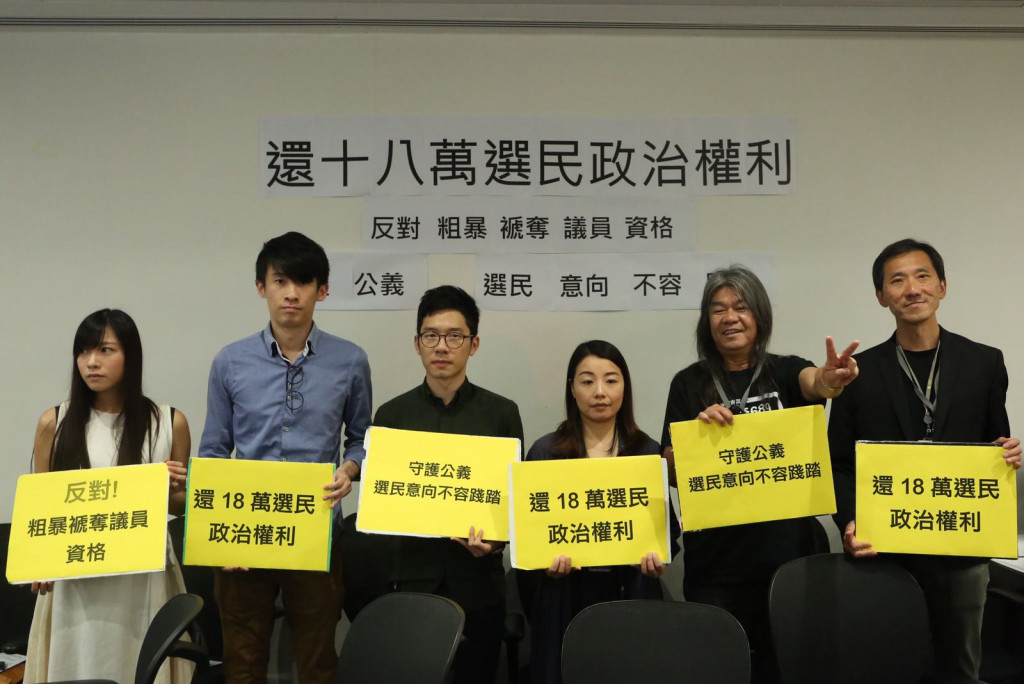
But the Administration of Chief Executive Leung Chun-ying was not content to let the matter rest there. In late 2016, he asked the court for a judicial review, selectively targeting four others among those who had embellished their original oaths in October. All had been allowed to retake the oath, in accordance with LegCo’s customary practice, and all had then taken their seats in the normal way.
The four: Lau Siu-lai (Kowloon West); Nathan Law Kwun-chung (Hong Kong Island); Edward Yiu Chung-yim, a Functional Constituency legislator; and most surprisingly, “Long Hair” Leung Kwok-hung (New Territories East), who has been responsible for disrupting more solemn occasions than anyone could remember.
The court responded in July, ruling that all four were at fault. They were immediately expelled from the chamber pending appeals. Their defence included arguments against selective punishment and retroactive application, neither of which are principles inherent in the Hong Kong system’s common law tradition.
Their lawyers argued that the four had been allowed to re-take their oaths following LegCo’s customary practice, and could rightly expect to be reinstated, which they initially were.
Beijing’s interpretation was issued on November 7, after the October 12 protest, several others had also embellished their oaths, and so on. All to no avail. The presiding judge seemed to have some difficulty explaining himself, especially on the selectivity aspect, but he ruled against the four, and these four only.
The disqualification of Leung Kwok-hung
Ultimately, only Long Hair carried the appeals process forward and rightly so since it was Leung who had set LegCo’s oath-taking precedent long before, in 2004. Leung was then a new legislator and wanted to make his dissident presence felt by writing his own oath. But unlike the Youngspiration duo in 2016, he thought it best to seek advice first via his favourite judicial review option.

Judge Hartmann ruled that such improvisations were not allowed. So, Leung took the standard oath, shouted out some slogans afterwards and was duly sworn in.
That set the precedent and allowing problematic oaths to be retaken also became standard practice, which was how the four were initially allowed to retake their oaths in 2016.
By 2019, however, the judges could not allow themselves to be impressed by such practices. The three-judge Court of Appeal panel strained instead to cite the reasons why none of those considerations signified in the wake of Beijing’s Basic Law Article 104 Interpretation.
On February 15, they announced their ruling, which followed all those who had ruled before them since 2014.
The judgement began with a precise description of Leung’s oath-taking in the LegCo chamber on October 12, 2016. This included the use of an open yellow umbrella, a symbol of the Umbrella Movement, a short statement of support for the movement, and the oath itself, which Leung repeated fully but in a “halting manner”.
The presiding officer had nevertheless accepted Leung’s oath as valid. In challenging that decision, Chief Executive Leung Chun-ying and his Secretary for Justice argued that the oath had not been lawfully taken and the oath-taker should, therefore, be removed from office. The Appeal Court panel agreed.
For Leung Kwok-hung, Martin Lee SC argued that the Interpretation of Article 104 issued by the National People’s Congress Standing Committee (NPCSC) was not valid or binding on Hong Kong courts or at least should not be applied to events before it was issued.
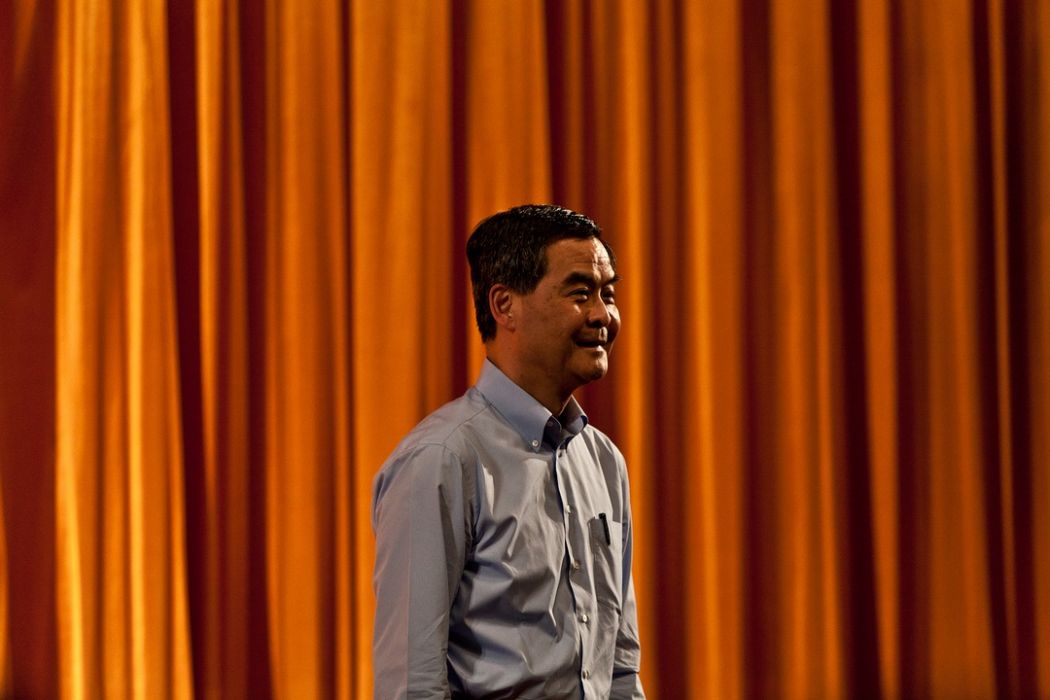
Alternatively, even if the Interpretation was valid, binding, and had retrospective effect, the oath taken by Leung was still valid because Hong Kong’s Oaths and Declarations Ordinance had not been amended in accordance with the specific new measures spelled out in Beijing’s interpretation. Therefore, these requirements were not yet prescribed by Hong Kong law.
Also, Leung had a legitimate expectation, based on his own past practices and LegCo’s acceptance of them, that his improvisations were in accord with acceptable oath-taking behaviour. And the presiding officer on the spot at the time should be qualified to rule immediately on the nature of an oath in relation to practices past and present, rather than judges in a distant court ruling at a later date.
The judges’ response:
To make a long story short, the Appeal Court panel gave no ground. The three judges rejected all Lee’s arguments. This was done by relying heavily on previous judgements that had been handed down since 2014, the same judgements that have been responsible for much of the public’s growing cynicism.
A favourite line was that “unless we revisit” the previous judgements with their fundamental propositions of law, “it is apparent that many of the questions… as to the Interpretation have already been authoritatively determined by the Court.”
The court complained that in challenging the validity, scope and effect of the Interpretation, Lee was essentially asking to “revisit” the fundamental propositions.
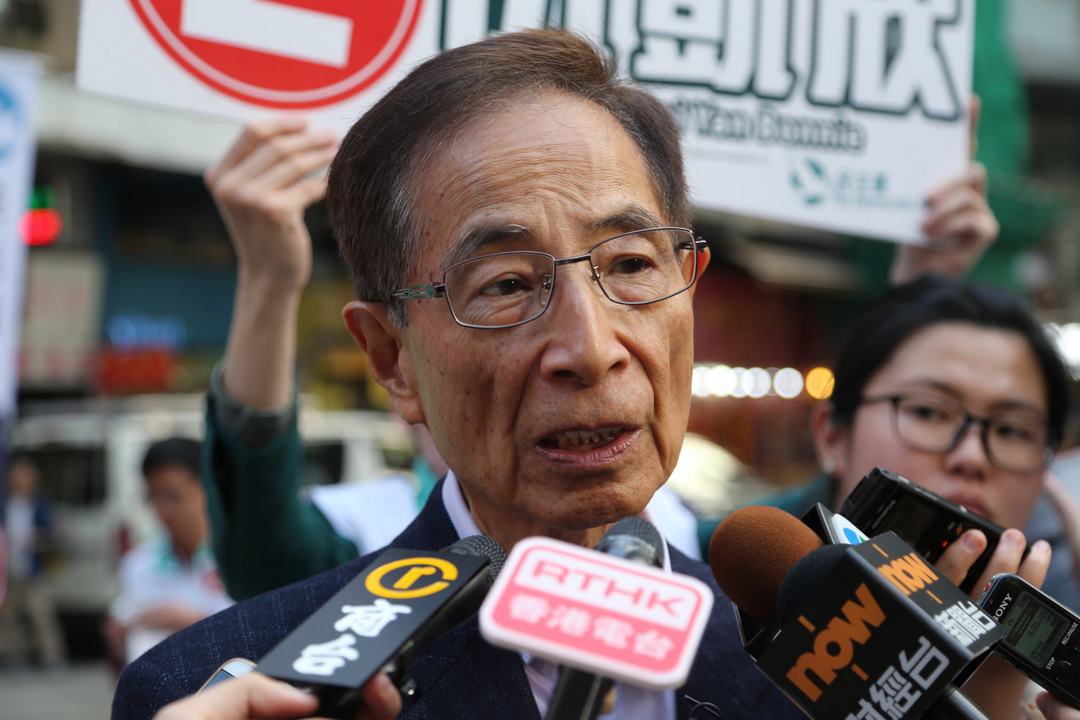
Which is of course just the point. The questions persist, they have not been adequately answered in language the public can understand, and nor has the reasoning that led to them. Otherwise, why appeal? And why does the court grant leave to proceed with so many appeals, knowing that the conclusions are not going to be any different from those that have gone before unless the basics can be “revisited”?
Many concerned citizens have been hoping for just such a re-visitation. Thus, the circuitous judicial route to public mistrust remains unbroken.
The February 15, judgement on Leung Kwok-hung’s case was a masterpiece of convoluted reasoning. It noted that when the Appeal Committee, as recently as September 1, 2017, saw no need to revisit the fundamental propositions, “such a course is not open to this Court.”
September 1, 2017, was the date that committee issued its reasoning on the disposition of disqualified legislator-elect Yau Wai-ching’s appeal. The full record of the Appeal Committee’s conclusions has apparently not been made public.
“By applying those undisputable fundamental propositions to the Interpretation, the Appeal Committee concluded that the Interpretation is binding on all the courts of Hong Kong, which must include this Court, as regards the true construction of Basic Law 104 on 12 October 2016.” The September 1, 2017, Appeal Committee decision in the Yau Wai-ching case was “a complete answer to Mr Lee’s challenges against the validity, scope and effect of the Interpretation,” the judgement said.
The committee had held that the NPCSC’s power to interpret Hong Kong’s Basic Law derived from Article 67 of the Chinese Constitution and was provided for in Hong Kong’s Basic Law Article 158. The power was general and unqualified.
An interpretation of the Basic Law issued by the NPCSC was binding on the Hong Kong courts. “It declares what the law is and has always been since the coming into effect of the Basic Law on 1 July 1997.”

The authority of the Chinese constitution was “fully acknowledged and respected in Hong Kong. Indeed, such an interpretation of by the NPCSC is binding in and part of the system in Hong Kong.” This also means that the “NPCSC can supplement a provision of the Basic Law when interpreting it,” which Hong Kong courts also accept.
The retrospectivity trap still un-revisited
Evidently, one reason for allowing so many appeals is not in anticipation that anyone might succeed in overturning the original disqualification verdict, but rather to provide additional opportunities to ensure that they are not, to reiterate the new rules under which Hong Kong’s legal system must operate, and drive home the message that resistance is futile.
But message or no, one major question remains unanswered. From the start, the disqualified legislators and their lawyers have been challenging the retrospective disqualification for actions that were taken before the new version of Article 104 was issued. Retrospective application is not a feature of Hong Kong’s common law tradition.

Yet in place of reasons, the only response has been that the Interpretation, once issued on November 7, 2016, instantly became “what the law has always been,” dating back to day one when the Basic Law went into effect on July 1, 1997. The phrase has become a sardonic punch-line for the disqualification era.
How can it be, people have asked? And still, they must, despite the February 15 ruling, which actually includes a section addressing Martin Lee’s retrospectivity challenge. Instead of explaining this, the ruling gets entangled in an argument with Lee over whether the interpretation was more a supplement than an interpretation. Lee had argued that because the interpretation added to the law it should not be enforced retroactively.
On this point, the February 15 ruling evidently agreed. If it really was primarily a supplement, then it should not be retroactively enforced. But then the panel wanders off into an explanation of how, with prior Interpretations, it had not yet been fully understood whether an Interpretation could both clarify and supplement.
And the panel also acknowledged that: “To date, there has been no direct judicial authority in Hong Kong-based on expert evidence on PRC law, that both clarification and supplementation in an interpretation of the Basic Law should take effect on l July 1997.”
However, even though aware of the possibility that an Interpretation could both clarify and supplement, Hong Kong’s Court of Final Appeal “has consistently reaffirmed the retrospective effect of an interpretation of the Basic Law by the NPCSC… without drawing any distinction between clarification and supplementation.”
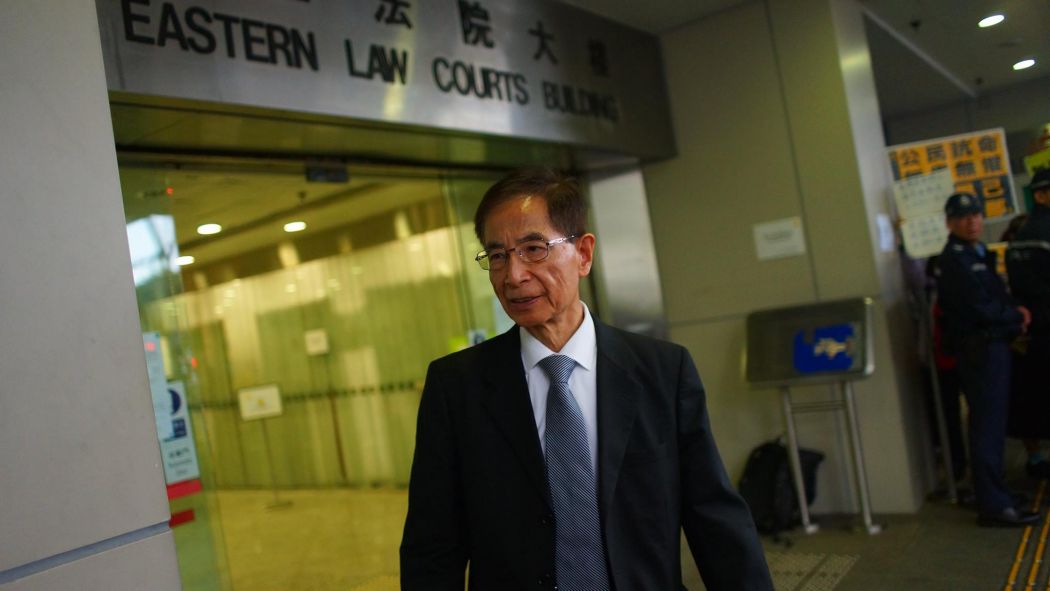
Nevertheless, there was a hint of the strain the judges are labouring under as they find themselves straddling the two, Mainland civil law and Hong Kong common law, systems.
The panel noted that in one of the earlier Interpretation cases, “the Court of Final Appeal relied on the common law declaratory theory of judicial decisions to hold that the interpretation issued by the NPCSC of the Basic Law in 1999 in that case took effect on the operation of the Basic Law, that is, 1 July 1997.”
This sentence contains the clue to Hong Kong’s retrospectivity trap. The panel might have gone on to add, just for the sake of curious voters who have been disenfranchised by the disqualifications, that common law follows the retrospective principle in one relevant kind of case.
The cases are those that involve the interpretation of statutory law, or laws passed by legislatures. The National People’s Congress in Beijing is the Basic Law’s parent legislature. Case law, or judicial rulings in ordinary court cases, are not retroactive, meaning they do not apply to actions committed before a judgement was handed down.
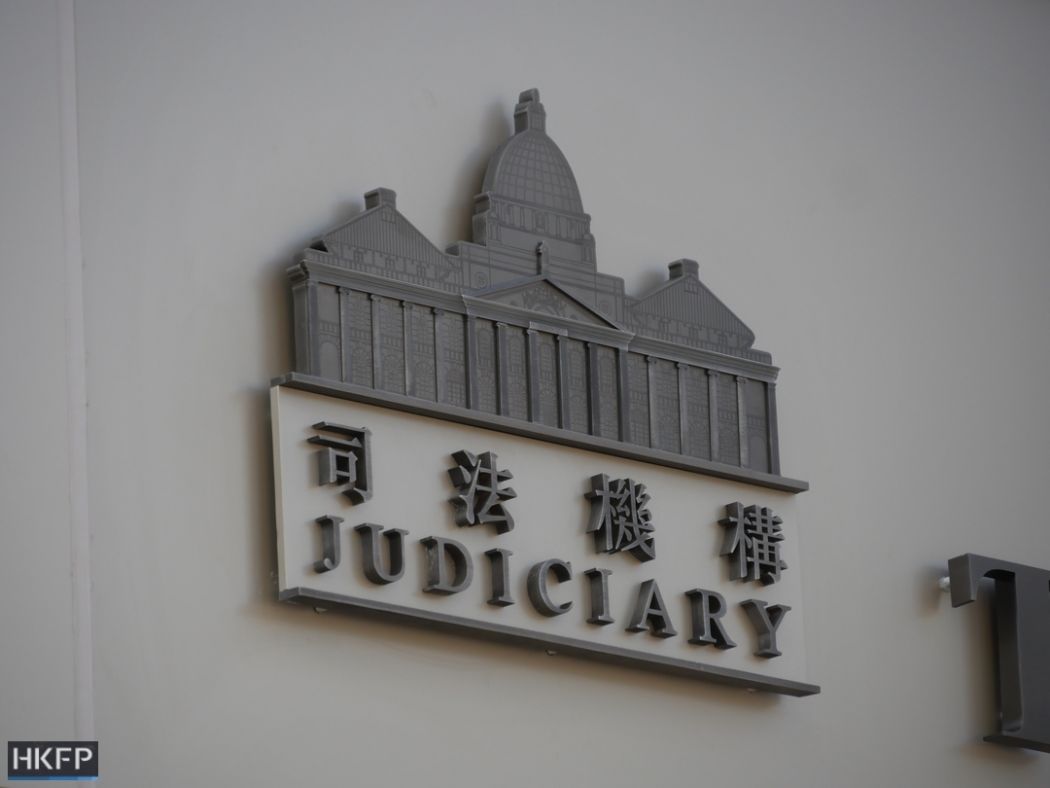
But mainland law itself is not retroactive unless a law expressly states it is, and none of the Basic Law Interpretations have stated this. Nor apparently, has anyone asked Beijing whether Article 67 of the Mainland Constitution on NPCSC interpretations carries any such implications.
And evidently, no one has ever asked Beijing whether – in the specific case of Hong Kong Basic Law Interpretations – the intention was that they should be retroactively enforced. And so, the circle of public mistrust remains unbroken.
An extra-judicial opinion it might be, but this seems to be one question that deserves a re-visitation. Word has it in official circles that the Hong Kong government instructed the judiciary on what the Interpretations are supposed to mean. If this is true, Leung Kwok-hung’s appeal ruling suggests that the strain of the assignment is becoming more than the judges can convincingly manage.
